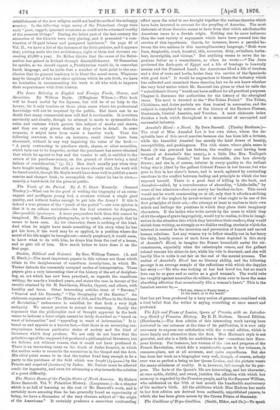Annabel's Rival : a Novel. By Dora Russell. (Tinsley Brothers.)—
The rival of Miss Annabel Lee is her own sister, whom the de- spicable hero of this novel marries because she has been left a fortune, while the beautiful Annabel has merely the fatal dower of beauty, susceptibility, and gushingness. The rich sister, whose plain name is Sarah (it has procured her fortune, the wealthy aunt baying been incensed at Annabel's fine name),. is a little like Mrs. Trollope's "Ward of Thorpe Combe," but less detestable, also less cleverly drawn ; and she is, of course, inferior in every quality to the radiant being who is jilted by the gallant Colonel Fraser in her favour, but who goes to live in her sister's house, and is much agitated by contending emotions in the conflict between feeling and principle to which she has exposed herself. There is a good deal of killing in the book, and Annabel—called, by a recrudescence of absurdity, " by some of her admirers—does not marry her brother-in-law. This novel would not be worth commenting on at all, only that it affords a striking example of the neglect by novel-writers of what ought to be one of the first principles of their art,—the attempt at least to realise to their own minds and feelings the positions in which they place their imaginary characters. If the ladies who write novels by the score in which they skirt the edges of grave impropriety, would try to realise, to live in imagi- nation in the situation into which they introduce their readers, they would shrink from writing, as strongly as we dislike reading, stories in which the interest is centred in the inversion and perversion of honest and sacred human relations. Let any woman try to follow steadily out in her fancy the daily, hourly course of such lives as those depicted in this story of Annabel's Rival, to imagine the Fraser household under the cir- cumstances, especially when the catastrophe comes, and the gallant colonel rescues his sister-in-law, while his wife is drowned, and she will hardly like to write it out fair at the end of the mental process. The author of Annabel's Rival has no literary ability, and the following passage is an average sample of the reflections with which she dapples her story :—" He who was looking at her had loved too, but no man's love can be so pure and so entire as a good woman's. The world rubs too roughly against masculine shoulders, for them ever to have the same absorbing affection that occasionally fills a woman's heart." This is the funniest answer to,—
"Tell me, where is Fancy bred,- In the heart, or in the head?"
that has yet been produced by a hazy notion of grammar, combined wit,h a fond belief that the writer is saying something at once smart and profound.


































 Previous page
Previous page